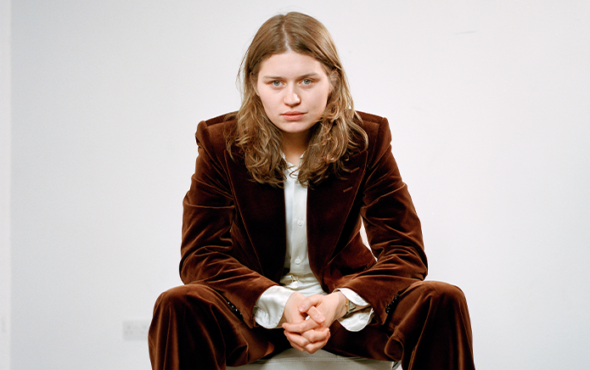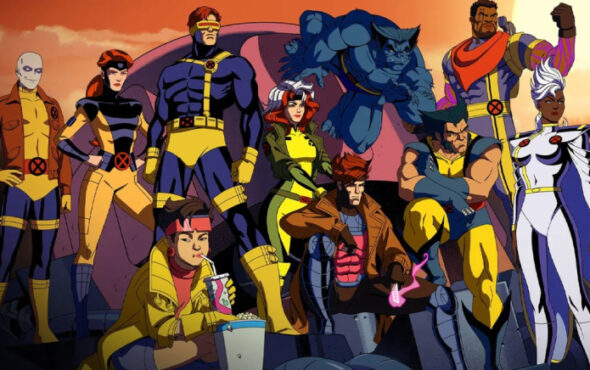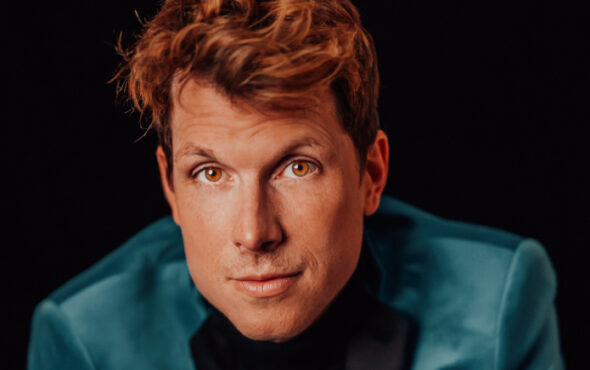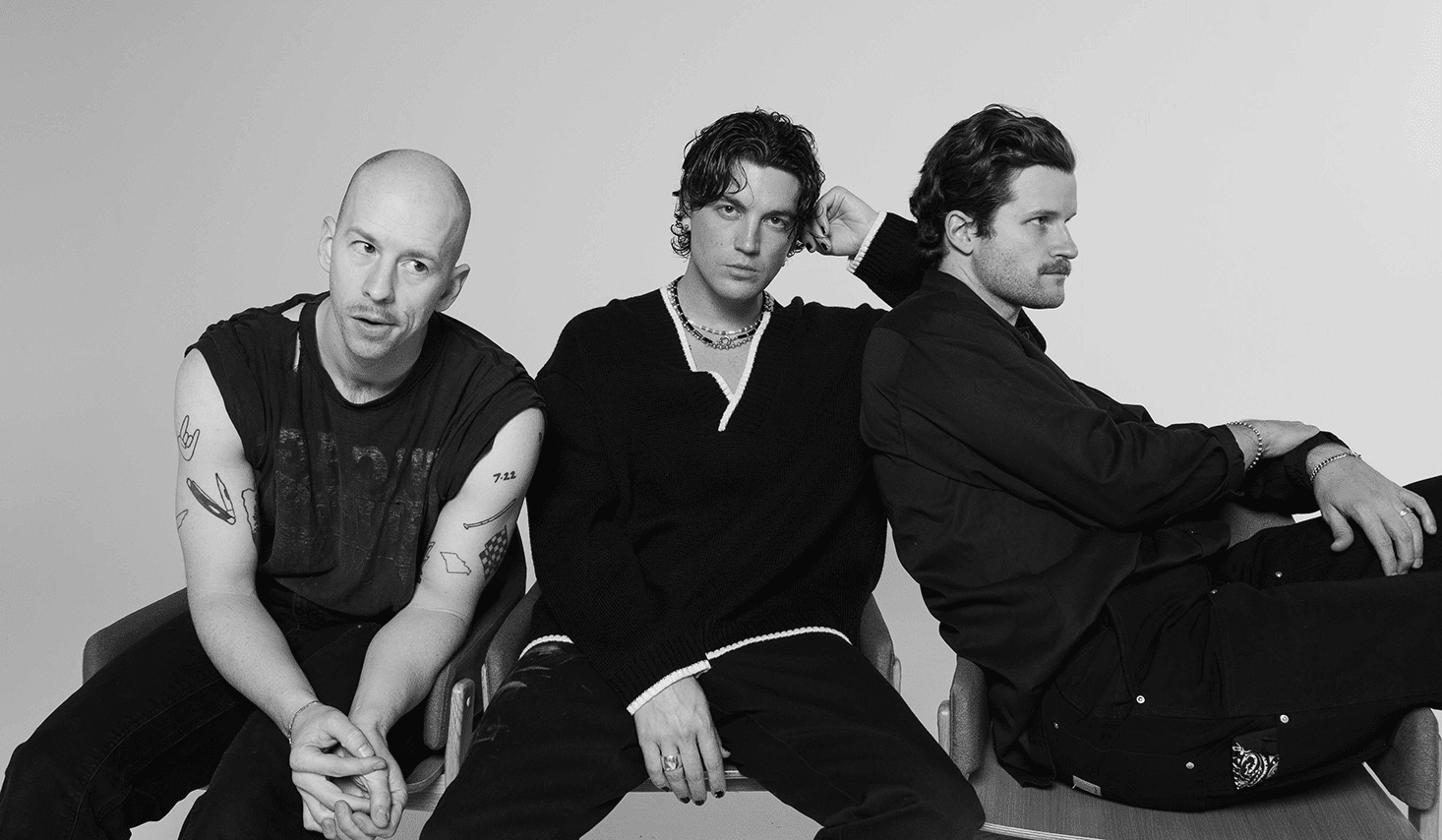
Paul Klein’s silhouette fills the screen. Behind him, a vibrant collage of overlapping images comes into view. It’s a light grey wall plastered with moodboard images. A shot of Kurt Cobain in his infamous olive cardigan sits alongside a blu tacked image of classic cowboy in light washed denim jeans chugging a drink. It’s a deconstructed visual of LANY’s third studio album, Mama’s Boy. This soft pop trio are trying something a little different. Gone are the days of Paul’s bleached blonde hair and, instead, the vocalist has shown up in a relaxed patchwork shirt and shoulder length brown hair. It’s a long way from his typical LA instagram image; it’s a refreshing change.
Change is something that has been occupying Paul’s mind. “Growing up in Oklahoma, I never thought this would be something anyone would want to hear me talk about. To be honest, I think I’ve hid it,” he tells GAY TIMES. “I wanted to get out of Oklahoma. I didn’t necessarily fit in. I had some dreams inside my heart that I felt I wouldn’t be able to chase there.” So, he changed the environment around him: “I moved to California and I fell in love with the weather, the sunsets and the coastline. You hear a lot of that in the early LANY songs. We saw LA with a sense of purity and innocence because the three of us (Paul Klein, Jake Goss, Les Priest) are from the middle of nowhere. We were experiencing all of this for the first time.”
After settling in as a band and continuously touring the world, Paul looked back on the changes he had made. “You know, I look up to bands like U2, Oasis and The Beatles and they all have a sense of geographical identity and you know where they’re from,” he says. It then dawned on the singer that this homebound connection was missing from LANY. “I was like, ‘You know what, that’s the one thing we might be lacking as a band. No one really knows where we’re from.’ While LA is amazing, it’s romanticized and I was thinking maybe it’s more relatable to talk about being from the middle of nowhere. Most of us can relate to the fact we’re not too crazy about our hometowns. We know what it’s like to be the middle of the road.” Now, with their new record, LANY hope to reclaim their roots: “We want to own who we are, where we’re from, and talk about it in a new light — I’m hoping it really resonates with a lot of people.”
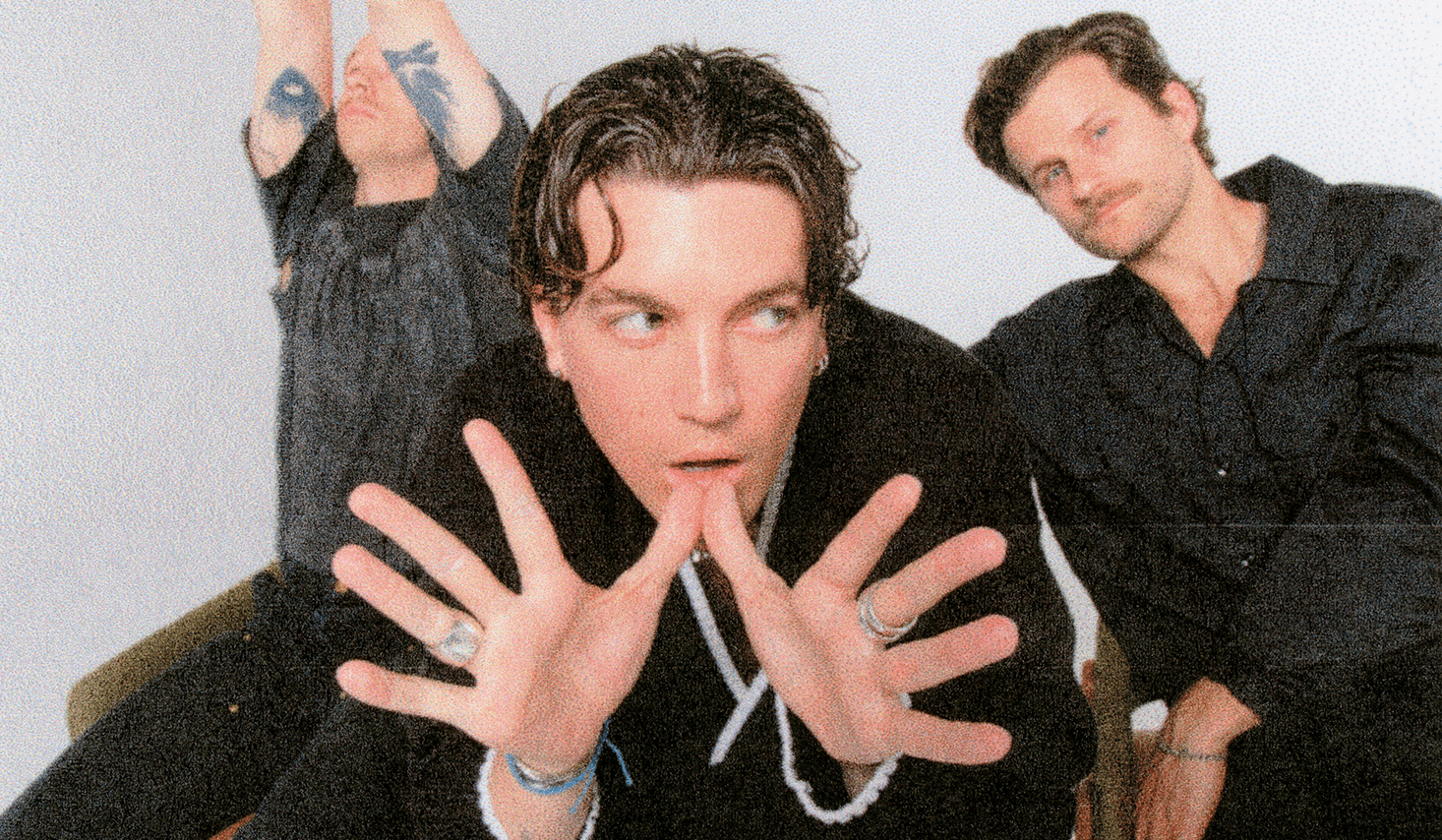
LANY is a band built on identity, after all, the name is a combination of LA (Los Angeles) and NY (New York), so it’s a welcoming turn that Paul wants to pay homage to his hometown, but, more importantly, he wants to share his story with fans. “I grew up listening to John Mayer, he told stories in songs and articulated really complex emotions and feelings. So, that was the kind of album I wanted to make. I want every song to pack a punch. I want every song to be incredibly well-thought-out and unique,” he explains. Inspired by Mayer and his own vision, the band chose to record in LA and write the album in Nashville. “We recorded the album here and we went to Nashville to write because you have different styles of songwriting in different cities. LA it’s very pop-centric, but Nashville has that whole energy. The city is centered around telling a story which I’m really, really interested in.”
By telling his story, Paul wanted to continue the personal narrative he had crafted and shared in LANY’s sophomore album, Malibu Nights. “Malibu Nights was obviously a breakup album,” he begins before pausing. The context of the album fills the brief silence. “If you paid attention to pop culture, then you know who the album was about. I could have run from that whole narrative or I could have chosen to be very vulnerable and transparent and that’s what I did. It wound up paying dividends for the band and that vulnerability was really accepted.” After finding freedom in his transparency, Paul wanted to channel the same qualities into this record. “The challenge was, how do I continue to be equally vulnerable on album three without a broken heart? I wasn’t anticipating anything like that. I wasn’t in a relationship and there wasn’t any chance of me getting my heart broken again,” he admits.
Paul’s tone picks up as he starts to explain why Mama’s Boy isn’t just a compact ode to family life, but an album centered around deep introspection. “That’s exactly how I would describe this album. It was very introspective, very self-reflective. I think there’s a lot of songs that are conversations with myself versus how you write a song for somebody. All of Malibu Nights was to someone,” he elaborates. “If you listen to that album and if you sing those songs, you’re probably singing those songs to somebody who hurt you and it was the same with the debut album. It’s similar with Mama’s Boy, songs like I Still Talk To Jesus, Bad News, even the song Sad. I mean, shit, there’s a song that is literally titled What I Wish Just One Person Would Say To Me that I wrote about how I want somebody to be happy for me, and understand what I’m doing is not super typical and there needs to be some grace, some room and some give and take, and some compromise.
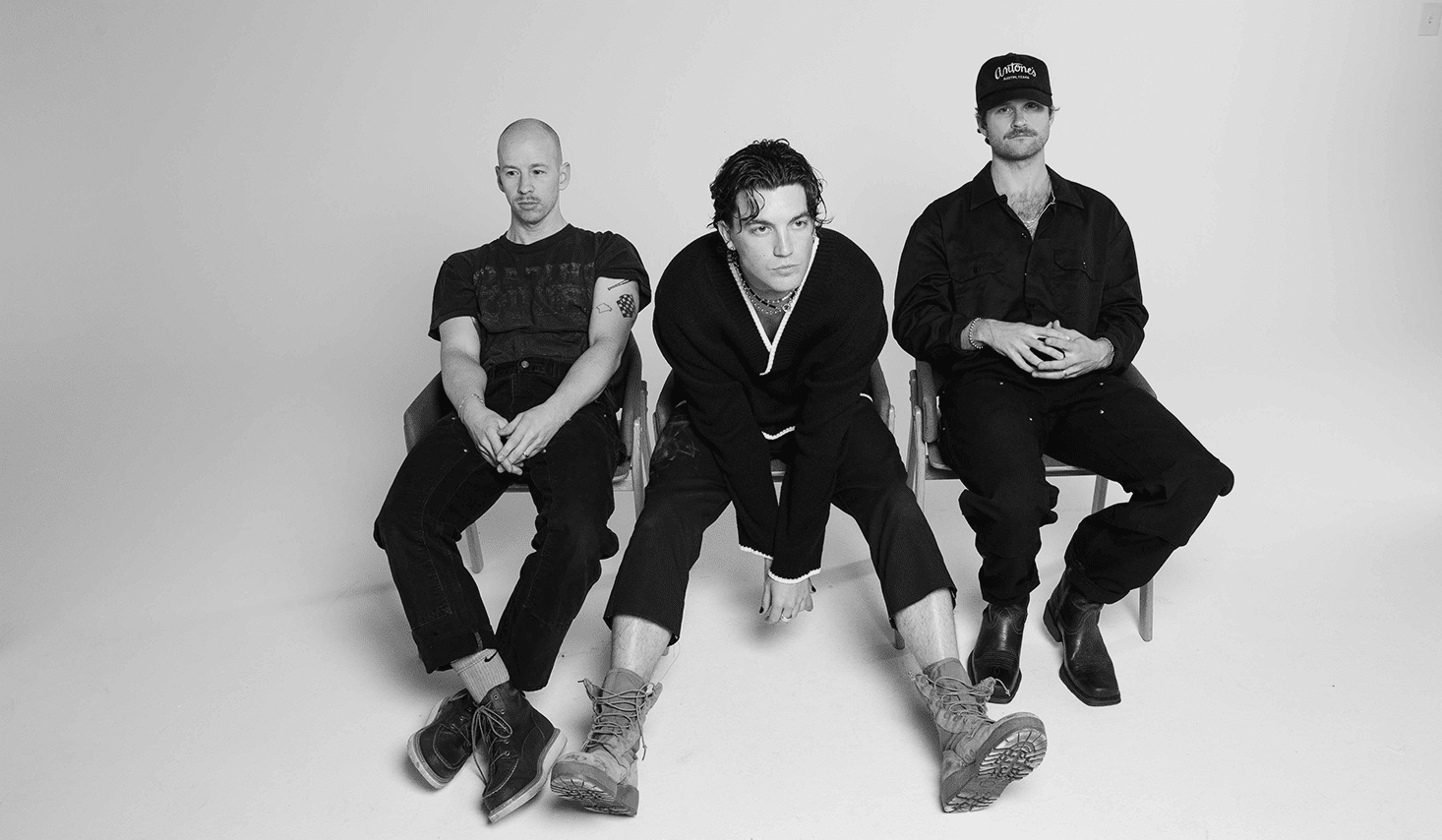
Capturing the unique sound of LANY was important to Paul, but he was sceptical of making the same record twice. Typically packed with synths and soft beats, the trio drifted away from this formula and leaned towards acoustic influences. “We’ve always said we don’t want to make the same album twice. If I’m being completely honest with you, when we turned in the first album, I knew there was a lot of room for growth and had a lot more in us. After that, we were making an album in a kitchen on a Dell computer,” he laughs, admitting that set up was all the band could afford at the time. “When we put out Malibu Nights, I thought, ‘Alright, we’re operating at our full potential’, so when it came to making Mama’s Boy, it was a question of, ‘How do we operate at that same level of excellence, but not deliver the same product again?’ It was really obvious to me that we have never played a LANY song with an acoustic guitar. It’s something that has a real sense of familiarity and I wanted that sense in our songs. We know you can’t please everybody and some people are already saying ‘Give us the old LANY!’ but we don’t want to produce the same record.”
When it comes to debuting a new sound, Paul isn’t too worried about the reception from fans. If anything, he is passionately dedicated to the fan base that has given LANY the platform they have today. “We’re super lucky to have the fan base that we have. If you’re thinking of LANY, it’s because you found us on your own. When you find a band on your own, there’s this loyalty and dedication that doesn’t ever go away,” he tells GAY TIMES. “I’m really thankful that we have the fan base we do so we can experiment, progress and grow with our music. At the end of the day, it’s still the three of us writing the songs and producing the album. Unless we drastically change as creatives and people, it’s always going to feel like LANY.”
The emotion and community of LANY is something Paul is visibly passionate about, so when I ask how about the success of the band, it’s the first time the American vocalist doesn’t have a quick response. Instead, he takes his time before responding. “I have moments of frustration or weakness where I will believe in a song or an album so much and it is probably connecting really well with a lot of people, but it’s just not enough for me. I’d be lying if I said I wasn’t. I don’t know if I need to define my expectations and maybe my goals a little better, so I know what I’m shooting for. That’s a really good question because I could talk to you about this for a long time.”
Now, in the midst of a pandemic, he admits releasing an album without being able to tour is taking some adjusting: “To be completely honest with you, it’s tough because you put a song out and it sits on the internet and you tell your fans about it on your social media platforms. Then you kind of say, ‘Okay, I’ll talk to you in a month when we put out another song.’ It’s tough. People will DM you saying, ‘This is the best LANY song, I loved Cowboy In LA’ and they’re super nice. You read the comments, but it doesn’t hit the same as when you’re at a show and people are singing with their chest or crying and you can tell that it really means a lot to them. That’s something that I’ve just kind of learned to accept and pivot during this period of time where we can’t play shows. But, you know what, every single fan that we have, we’ve worked our asses off for. Every single one of them. All 800,000 followers on Instagram or whatever. So, as long as we’re growing a little bit every single day, I’m cool with that.”
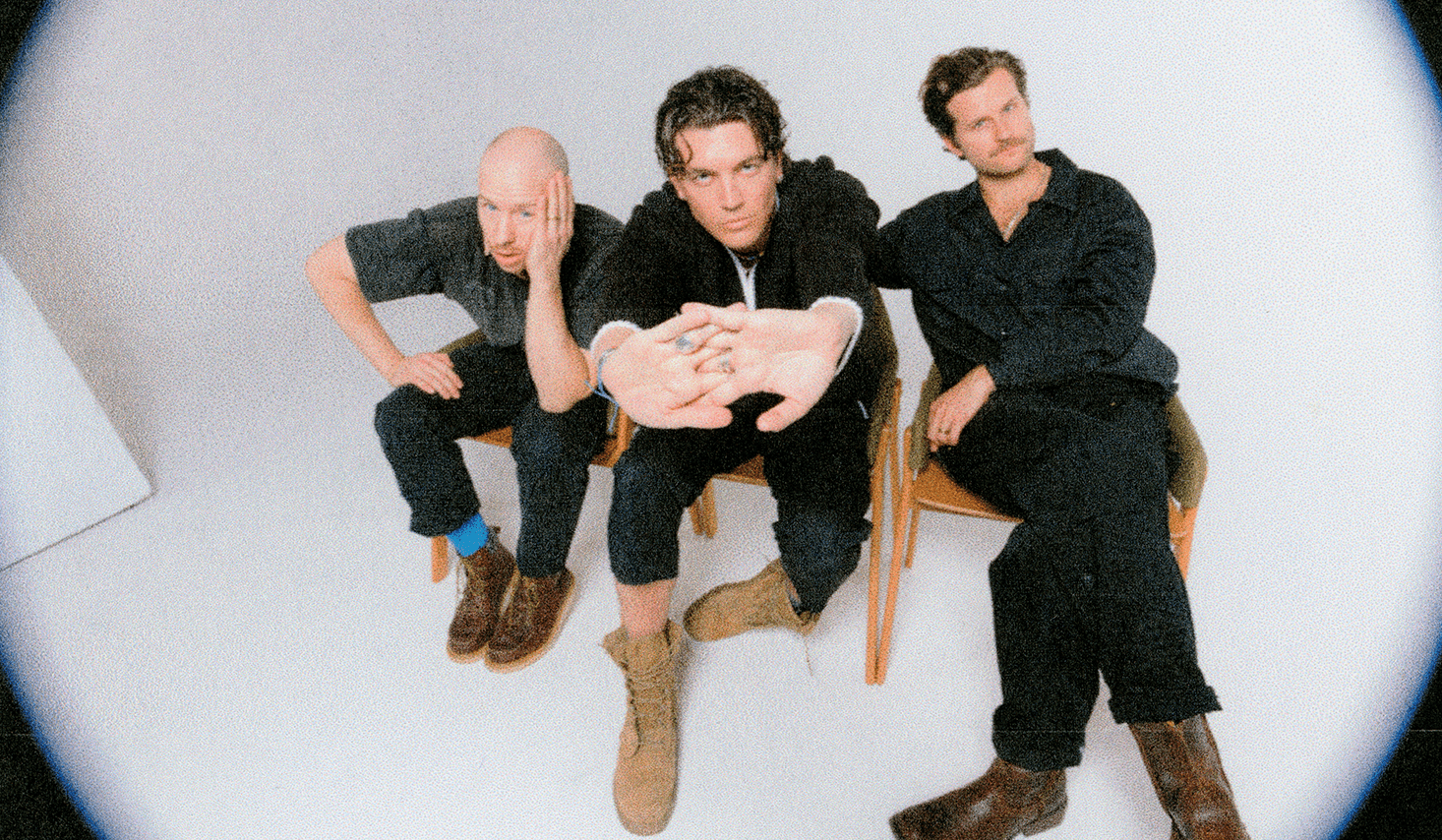
As the interview draws to a close, our conversation naturally shifts towards LANY’s ever-growing LGBTQ+ fanbase. “It’s so amazing. Anytime a song connects with anyone on any sort of level, it’s the biggest win for me. Even in my lifetime, there’s been a lot of progress made in the LGBTQ+ space and acceptance, but we clearly have a lot of room for improvement and a long way to go. So we plan to be a part of that generation in that movement and to fight for equality. Hopefully, in the next few years, these aren’t conversations we ever need to have, because there’ll be total love and acceptance.”
LANY’s brand of self-expression and acceptance pushes further than their music, but it’s something Paul tries to integrate into live performances too. “I write songs about my life, but I don’t want to be selfish about my art. Shows should be a celebration of life and should be a fun, safe place. There was this phrase that fans were throwing around that I really noticed, ‘Home is a LANY show,’” he recalls fondly. “Honestly, it really rang true for me, because I’m on tour more than I’m home and I’m on stage more than I’m in my bed. I’m myself on stage being 100% me. I write the songs, I do all the visuals, I choose my outfit, and I hope that inspires everyone to show up as 100% themselves.”
Suddenly, the singer remembers something that happened earlier that day. “I got a coffee this morning and I didn’t read my DM’s that much, but I did actually just see one. This girl had told me her nephew, who was 13, saw her painting her nails and asked if he could, and if he’s going to get made fun of if he does. She showed him my nails and told him that I was in a band and was so thankful that it could open up a conversation about self-expression and being exactly who you are. If a kid sees me doing me unapologetically and that inspires them to run with their own personal convictions and their style, that’s so sick. I had no idea that I would ever have that sort of influence or impact and I’m so grateful and I’ll be super responsible with that kind of influence and do the best that I can.
“I got that message literally this morning, 45 minutes before we started talking, and I genuinely had no idea that painting my nails would cause conversations like that to happen, but it’s amazing. I started painting a few years ago and not too many people were doing it yet. I knew that it was more of a feminine thing, but I just thought it looked cool and that’s always been my outlook on life. I’m just gonna do me because I spent a part of my life trying to be somebody that I wasn’t and I wasn’t very happy. So if I want to paint my nails, I’m going to. Now if I take it off I think it looks weird!”
LANY’s third studio album Mama’s Boy is out 2 October. Listen to their latest single, Cowboy in LA, here on Apple Music or below.

